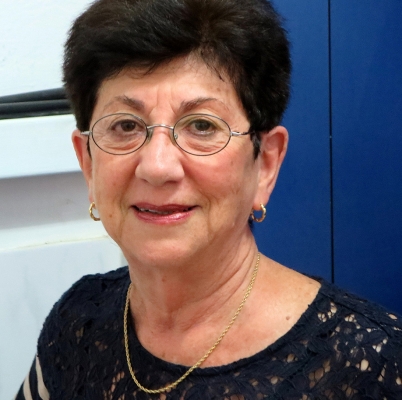Meet Lucille Edelman
ESRA Rehovot's face to many children
Though born and raised in Cape Town, South Africa, Lucille Edelman has deep roots in Israel.
Her maternal grandmother was a child of the First Aliyah. During the formative years of the state the family participated in the founding of Tel Aviv, Petach Tikva, and other cities. Lucille's great-grandfather was the first mohel in Tel Aviv.
Later, grandmother moved to Cape Town. There, lying next to her at bedtime, she would regale her granddaughter Lucille with tales of the first years of the pre-state Israel. These stories, told by a beloved grandmother, remained with Lucille through her life in South Africa.
Lucille's father was a businessman; her mother supported his work as they raised four children. Growing up in the 1940s and 50s, the children attended public school in Cape Town. Education there, Lucille tells us, was good. She attended a girls' high school and on graduation enrolled in the University of Cape Town. There, she majored in social work, which entailed intensive study in psychology and sociology. During her work at the Witwatersrand Mental Health Society, Johannesburg, Lucille met her husband, Benny, an anesthetist.
In the early seventies, South Africa was in upheaval. More importantly, Lucille told us, "Apartheid drove us to Israel. I could not tolerate the separation nor the treatment of the Blacks." The family packed up and came on aliyah in 1973.
Lucille and Benny found employment almost immediately in Israel. This marked the beginning of a 26-year career for Lucille as a social worker at Kaplan Hospital. The work was demanding. "I dealt with every kind of problem — family abuse, death, trauma of all sorts, injuries, hospitalization and rehabilitation," she told us. "It was exhausting."
Her retirement from this intensive work left Lucille looking to use her skills for a constructive purpose that would contribute to Israel. "I wanted to work with children," she says. "They are the future of the state and that is where I could contribute most."
At that time, the late 1990s, the ESRA Rehovot branch was forming. Lucille joined the branch, became a founding member, and found a need for her skills: interfacing with the moadiniot that the branch was supporting. These are afterschool programs for disadvantaged children at risk who need care and enrichment in their lives. The children, aged 6 to 10, are placed in the program as recommended by municipal social workers. For the next 20 years, Lucille would visit the moadiniot, confer with the teachers and meet with the children. She learned what their needs were and would come to the ESRA Rehovot branch with requests to fund needs beyond the standard funding — for holiday celebrations and gifts, birthday parties, special activities, trips, and the like. Lucille was the face of ESRA to these children.
Today, personal needs intervene, and Lucille has less time for ESRA and the moadoniot. She is ready to hand over her work with the children to the next person. Dozens of children remember her as "Mrs. ESRA" however. Work well done, Lucille.








Comments